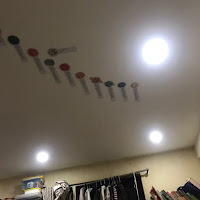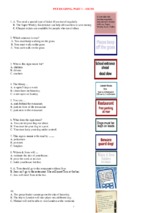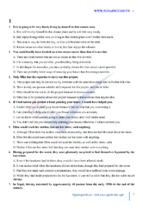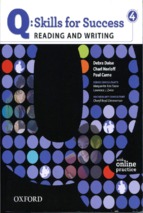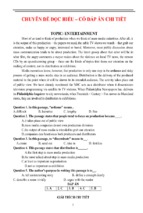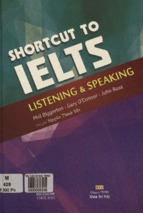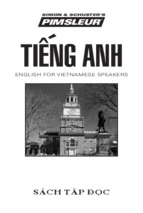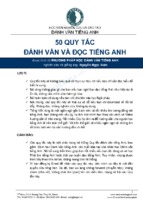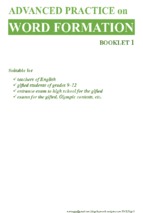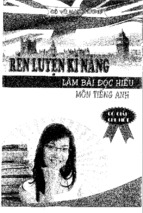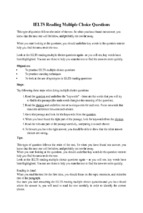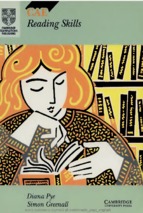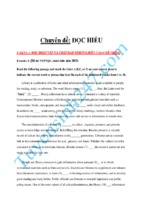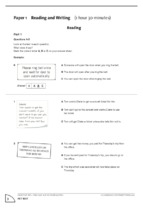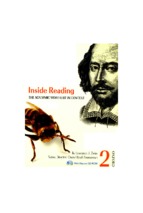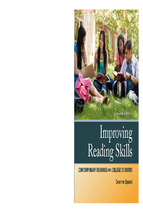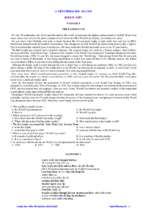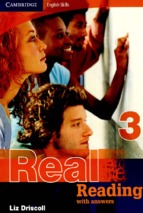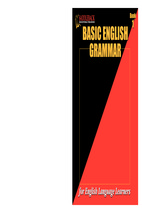ĐỀ KIỂM TRA HỌC SINH GIỎI - NĂM HỌC 2015 - 2016
MÔN : ANH VĂN – KHỐI 10
Thời gian làm bài: 90 phút (không kể thời gian giao đề)
Họ, tên thí sinh:.................................................. Số báo danh:........................
PART I: PHONETICS (10 points)
I. Choose the word which has the underlined part pronounced differently from that of the others.
Identify your answer by circling the corresponding letter A, B, C or D. (5 pts)
1. A. classical
B. composer
C. answer
D. serious
2. A. humans
B. dreams
C. concerts
D. songs
3. A. depend
B. temperate
C. dental
D .telephone
4. A. spoon
B. wool
C. noon
D. bamboo
5. A. excursion
B. further
C .burial
D. turtle
II. Choose one word whose stress pattern is different identify your answer by circling the corresponding
letter A, B, C or D. (5 pts)
6. A. musician
B.museum
C. competent
D. computer
7. A. conversation
B. isolation
C. traditional
D. situation
8. A. capital
B. activity
C. different
D. opera
9. A. affect
B. effective
C. expand
D. charity
10. A. family
B. probably
C. animal
D. minority
PART II: GRAMMAR AND VOCABULARY (20 points)
Complete the following sentences by choosing the correct answer among four option (A, B, C or D)
1. We discussed _____ the plans for the wedding.
A. for
B. to
C. about
D. Ø
C. Should
D. Does
2. _____ anyone phone, please tell them I’m busy.
A. If
B. Unless
3. Mr. Wilson was the only man left the coach _____ by the red car yesterday.
A. to be crashed
B. crashed
C. was crashed
D. be crashed
4. We have a lot of time, so we needn’t _____ this work today.
A. finish
B. to finish
C. finishing
D. be finishing
C. talking
D. saying
5. They were just _____ us about Mary’s wedding
A. speaking
B. telling
6. After a review of a television broadcast, journalists discovered that their program was in _____ error.
Page 1 of 12
A. a
B. an
C. the
D. Ø
7. Government offices will be closed on July 4, 2005, in _____ of Independence Day.
A. observably
B. observe
C. observance
D. observatory
8. Pressures to reduce costs and increase profits have led managers to search for creative ways to improve staff
_____.
A. Productivity
B. processions
C. proximity
D. profusion
9. While _____ fabric design has the influence of ancient Egypt, the actual furniture exhibits a more European
influence.
A. it
B. the
C. and
D. every
10. The information you need to make wise investment decisions and build balanced portfolios of stocks _____
available on the Internet.
A. were
B. have
C. is
D. are
11. Our professor _____ the final research papers to be submitted before May 16.
A. have expected
B. expecting
C. to expect
D. expect
12. The _____ was temporarily out of order because of a short circuit, so many people had to walk up the stairs
instead.
A. Escalate
B. escalator
C. escalation
D. escalating
13. It is important that no person _____ to the station after office hours unless he or she has a permit.
A. Has been admitted
B. be admitted
C. is admitted
D. is admitting
C. would be
D. would have been
14. If I stand close to cat, I _____ allergic.
A. am
B. will be
15. We pride ourselves on having the widest _____ of books available for our customers.
A. selection
B. identification
C. perception
D. recognition
16. _____ I forget, please remind me of my promise.
A. Thank to
B. Instead of
C. Although
D. In case
17. Paradise Resort requests that guests _____ reservations at least a month in advance.
A. making
B. made
C. make
D. makes
18. Hard work can make _____ a lack of intelligence.
A. In
B. over
C. out
D. up for
C. the
D. Ø
19. All of _____ mourners were dressed in black.
A. A
B. an
20. Individuals and companies should aware that _____ days may vary by country due to a difference in the
public holidays observed.
A. business
B. working
C. job
D. operating
Page 2 of 12
PART III: READING (40 points)
Read the text below. Use the words given in capitals at the end of each line to form a word that fits in the
space in the same line. (10 pts)
My ideal job
One thing I know is that I wouldn't like to have an occupation
OCCUPY
that has anything to do with physics, (1) .................................. or maths;
CHEMIST
I am not the (2) .................................. type at all. In fact at school, I was a
SCIENCE
complete (3) .................................. in these subjects. Neither am I very
FAIL
good at dealing with people, nor am I (4) .................................., so jobs in
AMBITION
business, administration and (5) .................................. don't really interest
MANAGE
me either. Moreover I find it (6) .................................. to be surrounded by
IRRITATE
a lot of people; I would much rather have a job involving creative
work or (7) .................................. skills of some sort. I'd like to have the
ART
chance to work outdoors (8) .................................. and perhaps do a bit of
OCCASION
travelling too. I am not (9) ............................ concerned about becoming
PARTICULAR
rich but I would like to have a (10) .................................. income - enough
REASON
to live comfortably.
Read the passage carefully, then choose the correct option (marked A, B, C or D) to answer the questions
(10pts)
The Creators of Grammar
No student of a foreign language needs to be told that grammar is complex. By changing word sequences and
by adding a range of auxiliary verbs and suffixes, we are able to communicate tiny variations in meaning. We
can turn a statement into a question, state whether an action has taken place or is soon to take place, and
perform many other word tricks to convey subtle differences in meaning. Nor is this complexity inherent to the
English language. All languages, even those of so-called 'primitive' tribes have clever grammatical
components. The Cherokee pronoun system, for example, can distinguish between 'you and I', 'several other
people and I' and 'you, another person and I'. In English, all these meanings are summed up in the one, crude
pronoun 'we'. Grammar is universal and plays a part in every language, no matter how widespread it
is. So the question which has baffled many linguists is - who created grammar?
At first, it would appear that this question is impossible to answer. To find out how grammar is created,
someone needs to be present at the time of a language's creation, documenting its emergence. Many historical
linguists are able to trace modern complex languages back to earlier languages, but in order to answer the
question of how complex languages are actually formed, the researcher needs to observe how languages are
started from scratch. Amazingly, however, this is possible.
Page 3 of 12
Some of the most recent languages evolved due to the Atlantic slave trade. At that time, slaves from a number
of different ethnicities were forced to work together under colonizer's rule. Since they had no opportunity to
learn each other's languages, they developed a make-shift language called a pidgin. Pidgins are strings of
words copied from the language of the landowner. They have little in the way of grammar, and in many cases it
is difficult for a listener to deduce when an event happened, and who did what to whom. [A] Speakers need to
use circumlocution in order to make their meaning understood. [B]Interestingly, however, all it takes for a
pidgin to become a complex language is for a group of children to be exposed to it at the time when they learn
their mother tongue. [C] Slave children did not simply copy the strings of words uttered by their elders, they
adapted their words to create a new, expressive language. [D] It included standardized word orders and
grammatical markers that existed in neither the pidgin language, nor the language of the colonizers. Complex
grammar systems which emerge from pidgins are termed creoles, and they are invented by children.
Further evidence of this can be seen in studying sign languages for the deaf. Sign languages are not simply a
series of gestures; they utilise the same grammatical machinery that is found in spoken languages. Moreover,
there are many different languages used worldwide. The creation of one such language was documented quite
recently in Nicaragua. Previously, all deaf people were isolated from each other, but in 1979 a new government
introduced schools for the deaf. Although children were taught speech and lip reading in the classroom, in the
playgrounds they began to invent their own sign system, using the gestures that they used at home. It was
basically a pidgin. Each child used the signs differently, and there was no consistent grammar. However,
children who joined the school later, when this inventive sign system was already around, developed a quite
different sign language. Although it was based on the signs of the older children, the younger children's
language was more fluid and compact, and it utilised a large range of grammatical devices to clarify meaning.
What is more, all the children used the signs in the same way. A new creole was born.
Some linguists believe that many of the world's most established languages were creoles at first. The English
past tense –ed ending may have evolved from the verb 'do'. 'It ended' may once have been 'It end-did'.
Therefore it would appear that even the most widespread languages were partly created by children. Children
appear to have innate grammatical machinery in their brains, which springs to life when they are first trying to
make sense of the world around them. Their minds can serve to create logical, complex structures, even when
there is no grammar present for them to copy.
1. In paragraph 1, why does the writer include information about the Cherokee language?
A. To show how simple, traditional cultures can have complicated grammar structures.
B. To show how English grammar differs from Cherokee grammar
C. To prove that complex grammar structures were invented by the Cherokees
D. To demonstrate how difficult it is to learn the Cherokee language
2. What can be inferred about the slaves’ pidgin language?
Page 4 of 12
A. It contained complex grammar.
B. It was based on many different languages.
B. It was difficult to understand, even among slaves. D. It was created by the land-owners.
3. All the following sentences about Nicaraguan sign language are true EXCEPT:
A. The language has been created since 1979.
B. The language is based on speech and lip reading.
C. The language incorporates signs which children used at home.
D. The language was perfected by younger children.
4. In paragraph 3, where can the following sentence be placed?
It included standardized word orders and grammatical markers that existed in neither the pidgin
language, nor the language of the colonizers.
A. A
B. B
C. C
D. D
5. “From scratch” in paragraph 2 is closest in meaning to:
6.
A. From the very beginning
C. By copying something else
B. In simple cultures
D. By using written information
“Make-shift” in paragraph 3 is closest in meaning to:
A. Complicated and expressive
C. Extensive and diverse
B. Simple and temporary
D. Private and personal
7. Which sentence is closest in meaning to the underlined sentence?
Grammar is universal and plays a part in every language, no matter how widespread it is.
A. All languages, whether they are spoken by a few people or a lot of people, contain grammar.
B. Some languages include a lot of grammar, whereas other languages contain a little.
C. Languages which contain a lot of grammar are more common that languages that contain a little.
D. The grammar of all languages is the same, no matter where the languages evolved.
8. All of the following are features of the new Nicaraguan sign language EXCEPT:
A. All children used the same gestures to show meaning.
B. The meaning was clearer than the previous sign language.
C. The hand movements were smoother and smaller.
D. New gestures were created for everyday objects and activities.
9. Which idea is presented in the final paragraph?
A. English was probably once a creole.
B. The English past tense system is inaccurate.
C. Linguists have proven that English was created by children.
D. Children say English past tenses differently from adults.
Page 5 of 12
10. Look at the word “consistent” in paragraph 4. This word could best be replaced by which of the
following?
A. Natural
B. Predictable
C. Imaginable
D. uniform
Fill in each blank in the following passages with one suitable word to make meaningful ones. (20 pts)
Since the world became industrialized, the number of animal species that have (1) _____ became extinct or
have (2) ___ extinction has increased. Bengal tigers, for instance, which once roamed the jungles in vast
numbers, now number only about 2,300. By (3) _____ year 2025, it is estimated that they will become extinct.
(4) _____ is alarming about the case of the Bengal tiger is that this extinction will have been caused almost
entirely by poachers (5) _____, according to some sources, are not always interested in material (6) _____ but
in personal gratification. This is an example of the insensitivity that is (7) __to the problem of extinction.
Animals such (8) ____ the Bengal tiger, as (9) _____ as other endangered species, are valuable parts of the
world’s ecosystem. International laws protecting these animals must be (10) ____to ensure their survival – and
the survival of our planet.
PART IV: WRITING (30 points)
I. Write the new sentences using the given word. Do not change the word given in any way. (20 pts)
1. The money is not to be paid under any circumstances. (NO)
_______________________________________________________________
2. After the earthquake, the city resembled a battlefield. (TOOK)
________________________________________________________________
3. The man has finally successful in solving the problem. (GO)
The man finally __________________________________________________
4. He worked very hard but he was unable to earn enough for his living. (ENDS)
Hard-working ___________________________________________________
5. I was bitterly disappointed they didn’t give me a part in the school play. (PASSED)
Very much ______________________________________________________
II. Rewrite each of the following sentences so that it has a similar meaning to the original one. (10 pts)
1. Mary didn’t pass the exam because she didn’t study hard.
Had ___________________________________________________________
2. Villagers think that he broke into her house.
He _________________________________________________________
3. I haven’t seen that man here before.
It’s ____________________________________________________
4. Although Bob didn’t speak Dutch, he decided to settle in Amsterdam
In spite of _______________________________________________
Page 6 of 12
5. Without this treatment, the patient have died
If the patient _____________________________________________
HƯỚNG DẪN KIỂM TRA HỌC SINH GIỎI - NĂM HỌC 2015 - 2016
MÔN ANH VĂN – KHỐI 10
PART I: PHONETICS
I. Choose the word which has the underlined part pronounced differently from that of the others.
Identify your answer by circling the corresponding letter A, B, C or D. (5 pts)
1. A. classical
B. composer
C. answer
D. serious
2. A. humans
B. dreams
C. concerts
D. songs
3. A. depend
B. temperate
C. dental
D .telephone
4. A. spoon
B. wool
C. noon
D. bamboo
5. A. excursion
B. further
C .burial
D. turtle
II. Choose one word whose stress pattern is different identify your answer by circling the corresponding
letter A, B, C or D. (5 pts)
6. A. musician
B.museum
C. competent
D. computer
7. A. conversation
B. isolation
C. traditional
D. situation
8. A. capital
B. activity
C. different
D. opera
9. A. affect
B. effective
C. expand
D. charity
10. A. family
B. probably
C. animal
D. minority
PART II: GRAMMAR AND VOCABULARY
Complete the following sentences by choosing the correct answer among four option (A, B, C or D) (20
pts)
1. We discussed _____ the plans for the wedding.
B. for
B. to
C. about
D. Ø
2. _____ anyone phone, please tell them I’m busy.
B. If
B. Unless
C. Should
D. Does
3. Mr. Wilson was the only man left the coach _____ by the red car yesterday.
B. to be crashed
B. crashed
C. was crashed
D. be crashed
4. We have a lot of time, so we needn’t _____ this work today.
B. finish
B. to finish
C. finishing
D. be finishing
5. They were just _____ us about Mary’s wedding
B. speaking
B. telling
C. talking
D. saying
6. After a review of a television broadcast, journalists discovered that their program was in _____ error.
B. a
B. an
C. the
D. Ø
7. Government offices will be closed on July 4, 2005, in _____ of Independence Day.
B. observably
B. observe
C. observance
D. observatory
Page 7 of 12
8. Pressures to reduce costs and increase profits have led managers to search for creative ways to improve
staff _____.
B. Productivity
B. processions
C. proximity
D. profusion
9. While _____ fabric design has the influence of ancient Egypt, the actual furniture exhibits a more
European influence.
B. it
B. the
C. and
D. every
10. The information you need to make wise investment decisions and build balanced portfolios of stocks
_____ available on the Internet.
B. were
B. have
C. is
D. are
11. Our professor _____ the final research papers to be submitted before May 16.
B. have expected
B. expecting
C. to expect
D. expect
12. The _____ was temporarily out of order because of a short circuit, so many people had to walk up the
stairs instead.
B. Escalate
B. escalator
C. escalation
D. escalating
13. It is important that no person _____ to the station after office hours unless he or she has a permit.
B. Has been admittedB. be admitted
C. is admitted
D. is admitting
14. If I stand close to cat, I _____ allergic.
B. am
B. will be
C. would be
D. would have been
15. We pride ourselves on having the widest _____ of books available for our customers.
B. selection
B. identification
C. perception
D. recognition
16. _____ I forget, please remind me of my promise.
B. Thank to
B. Instead of
C. Although
D. In case
17. Paradise Resort requests that guests _____ reservations at least a month in advance.
B. making
B. made
C. make
D. makes
18. Hard work can make _____ a lack of intelligence.
B. In
B. over
C. out
D. up for
19. All of _____ mourners were dressed in black.
B. A
B. an
C. the
D. Ø
20. Individuals and companies should aware that _____ days may vary by country due to a difference in the
public holidays observed.
B. business
B. working
C. job
D. operating
PART III: READING
Read the text below. Use the words given in capitals at the end of each line to form a word that fits in the
space in the same line. (10 pts)
My ideal job
One thing I know is that I wouldn't like to have an occupation
OCCUPY
that has anything to do with physics, (1) .................................. or maths;
CHEMIST
I am not the (2) .................................. type at all. In fact at school, I was a
SCIENCE
Page 8 of 12
complete (3) .................................. in these subjects. Neither am I very
good at dealing with people, nor am I (4) .................................., so jobs in
business, administration and (5) .................................. don't really interest
me either. Moreover I find it (6) .................................. to be surrounded by
a lot of people; I would much rather have a job involving creative
work or (7) .................................. skills of some sort. I'd like to have the
chance to work outdoors (8) .................................. and perhaps do a bit of
travelling too. I am not (9) ............................ concerned about becoming
rich but I would like to have a (10) .................................. income - enough
to live comfortably.
FAIL
AMBITION
MANAGE
IRRITATE
ART
OCCASION
PARTICULAR
REASON
1. chemistry
2. scientific
3. failure
4. ambitious
5.managemen
t
6. irritating
7. artistic
8. occasionally
9. particularly
10. reasonable
Read the passage carefully, then choose the correct option (marked A, B, C or D) to answer the questions
(10pts)
The Creators of Grammar
No student of a foreign language needs to be told that grammar is complex. By changing word sequences and
by adding a range of auxiliary verbs and suffixes, we are able to communicate tiny variations in meaning. We
can turn a statement into a question, state whether an action has taken place or is soon to take place, and
perform many other word tricks to convey subtle differences in meaning. Nor is this complexity inherent to the
English language. All languages, even those of so-called 'primitive' tribes have clever grammatical
components. The Cherokee pronoun system, for example, can distinguish between 'you and I', 'several other
people and I' and 'you, another person and I'. In English, all these meanings are summed up in the one, crude
pronoun 'we'. Grammar is universal and plays a part in every language, no matter how widespread it
is. So the question which has baffled many linguists is - who created grammar?
At first, it would appear that this question is impossible to answer. To find out how grammar is created,
someone needs to be present at the time of a language's creation, documenting its emergence. Many historical
linguists are able to trace modern complex languages back to earlier languages, but in order to answer the
question of how complex languages are actually formed, the researcher needs to observe how languages are
started from scratch. Amazingly, however, this is possible.
Some of the most recent languages evolved due to the Atlantic slave trade. At that time, slaves from a number
of different ethnicities were forced to work together under colonizer's rule. Since they had no opportunity to
learn each other's languages, they developed a make-shift language called a pidgin. Pidgins are strings of
words copied from the language of the landowner. They have little in the way of grammar, and in many cases it
is difficult for a listener to deduce when an event happened, and who did what to whom. [A] Speakers need to
use circumlocution in order to make their meaning understood. [B]Interestingly, however, all it takes for a
pidgin to become a complex language is for a group of children to be exposed to it at the time when they learn
their mother tongue. [C] Slave children did not simply copy the strings of words uttered by their elders, they
Page 9 of 12
adapted their words to create a new, expressive language. [D] It included standardized word orders and
grammatical markers that existed in neither the pidgin language, nor the language of the colonizers. Complex
grammar systems which emerge from pidgins are termed creoles, and they are invented by children.
Further evidence of this can be seen in studying sign languages for the deaf. Sign languages are not simply a
series of gestures; they utilise the same grammatical machinery that is found in spoken languages. Moreover,
there are many different languages used worldwide. The creation of one such language was documented quite
recently in Nicaragua. Previously, all deaf people were isolated from each other, but in 1979 a new government
introduced schools for the deaf. Although children were taught speech and lip reading in the classroom, in the
playgrounds they began to invent their own sign system, using the gestures that they used at home. It was
basically a pidgin. Each child used the signs differently, and there was no consistent grammar. However,
children who joined the school later, when this inventive sign system was already around, developed a quite
different sign language. Although it was based on the signs of the older children, the younger children's
language was more fluid and compact, and it utilised a large range of grammatical devices to clarify meaning.
What is more, all the children used the signs in the same way. A new creole was born.
Some linguists believe that many of the world's most established languages were creoles at first. The English
past tense –ed ending may have evolved from the verb 'do'. 'It ended' may once have been 'It end-did'.
Therefore it would appear that even the most widespread languages were partly created by children. Children
appear to have innate grammatical machinery in their brains, which springs to life when they are first trying to
make sense of the world around them. Their minds can serve to create logical, complex structures, even when
there is no grammar present for them to copy.
1. In paragraph 1, why does the writer include information about the Cherokee language?
A. To show how simple, traditional cultures can have complicated grammar structures.
B. To show how English grammar differs from Cherokee grammar
C. To prove that complex grammar structures were invented by the Cherokees
D. To demonstrate how difficult it is to learn the Cherokee language
2. What can be inferred about the slaves’ pidgin language?
A. It contained complex grammar.
B. It was based on many different languages.
C. It was difficult to understand, even among slaves.
D. It was created by the land-owners.
3. All the following sentences about Nicaraguan sign language are true EXCEPT:
A. The language has been created since 1979.
B. The language is based on speech and lip reading.
C. The language incorporates signs which children used at home.
D. The language was perfected by younger children.
4. In paragraph 3, where can the following sentence be placed?
It included standardized word orders and grammatical markers that existed in neither the pidgin
language, nor the language of the colonizers.
Page 10 of 12
A. A
B. B
C. C
D. D
5. “From scratch” in paragraph 2 is closest in meaning to:
A. From the very beginning
B. In simple cultures
C. By copying something else
D. By using written information
6. “Make-shift” in paragraph 3 is closest in meaning to:
A. Complicated and expressive
B. Simple and temporary
C. Extensive and diverse
D. Private and personal
7. Which sentence is closest in meaning to the underlined sentence?
Grammar is universal and plays a part in every language, no matter how widespread it is.
A. All languages, whether they are spoken by a few people or a lot of people, contain grammar.
B. Some languages include a lot of grammar, whereas other languages contain a little.
C. Languages which contain a lot of grammar are more common that languages that contain a little.
D. The grammar of all languages is the same, no matter where the languages evolved.
8. All of the following are features of the new Nicaraguan sign language EXCEPT:
A. All children used the same gestures to show meaning.
B. The meaning was clearer than the previous sign language.
C. The hand movements were smoother and smaller.
D. New gestures were created for everyday objects and activities.
9. Which idea is presented in the final paragraph?
A. English was probably once a creole.
B. The English past tense system is inaccurate.
C. Linguists have proven that English was created by children.
D. Children say English past tenses differently from adults.
10. Look at the word “consistent” in paragraph 4. This word could best be replaced by which of the
following?
A. Natural
B. Predictable
C. Imaginable
D. uniform
Fill in each blank in the following passages with one suitable word to make meaningful ones. (20 pts)
Since the world became industrialized, the number of animal species that have (1) _____ became extinct or
have (2) _____ extinction has increased. Bengal tigers, for instance, which once roamed the jungles in vast
numbers, now number only about 2,300. By (3) _____ year 2025, it is estimated that they will become extinct.
(4) _____ is alarming about the case of the Bengal tiger is that this extinction will have been caused almost
Page 11 of 12
entirely by poachers (5) _____, according to some sources, are not always interested in material (6) _____ but
in personal gratification. This is an example of the insensitivity that is (7) ____to the problem of extinction.
Animals such (8) _____ the Bengal tiger, as (9) _____ as other endangered species, are valuable parts of the
world’s ecosystem. International laws protecting these animals must be (10) _____ to ensure their survival –
and the survival of our planet.
1. either
2. neared
3. the
4. What
5. who
6. gain
7. contributing
8. as
9. well
10. enacted / passed
PART IV: WRITING
III.
Write the new sentences using the given word. Do not change the word given in any way. (20
pts)
1. The money is not to be paid under any circumstances. (NO)
Under no circumstances is the money to be paid.
2. After the earthquake, the city resembled a battlefield. (TOOK)
After the earthquake, the city took after a battlefield.
3. The man has finally successful in solving the problem. (GO)
The man finally managed to make a go of solving the problem.
4. He worked very hard but he was unable to earn enough for his living. (ENDS)
Hard-working as he was, he was unable to make ends meet.
5. I was bitterly disappointed they didn’t give me a part in the school play. (PASSED)
Very much to my disappointment, I was passed over for a part in the school play.
II. Rewrite each of the following sentences so that it has a similar meaning to the original one. (10 pts)
1.
Mary didn’t pass the exam because she didn’t study hard.
Had Mary studied hard, she would have passed the exam.
2.
Villagers think that he broke into her house.
He is thought to have broken into her house.
3. I haven’t seen that man here before.
It’s the first time (that) I have seen this man here
4. Although Bob didn’t speak Dutch, he decided to settle in Amsterdam
In spite of not speaking Dutch, Bob decided to settle in Amsterdam
5. Without this treatment, the patient have died
If the patient hadn’t been given this treatment, he would have died
Page 12 of 12
- Xem thêm -
